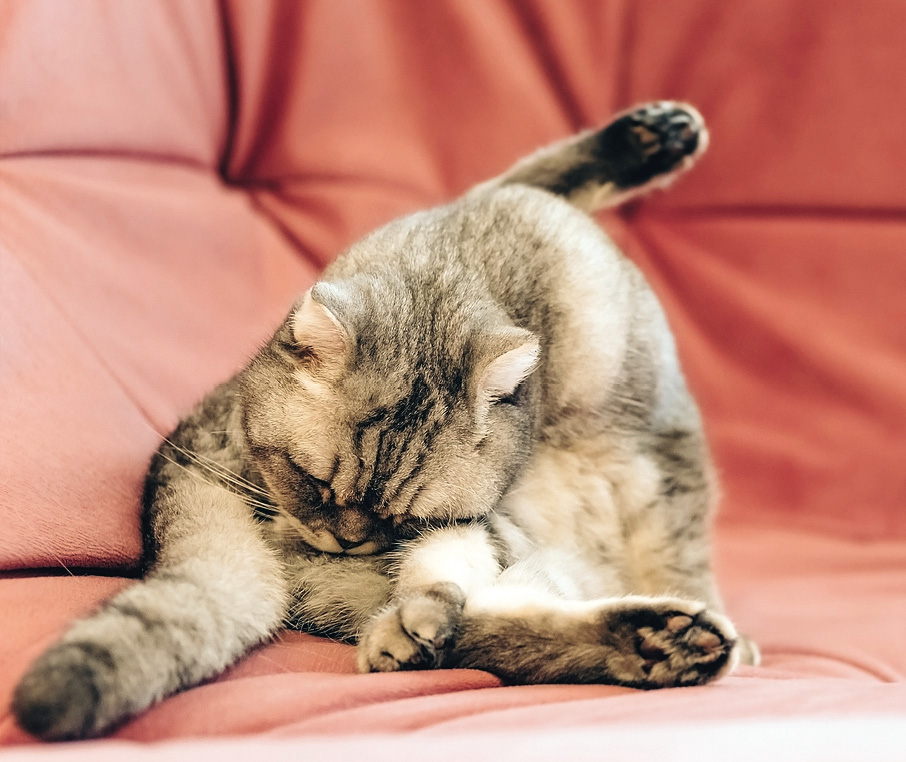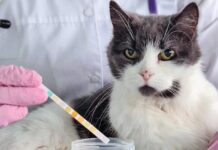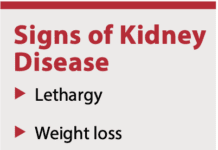Your senior cat has a ferocious appetite but is losing weight. It seems like she is super active all day and all night and meows nonstop. Your cat may be suffering from hyperthyroidism, a serious disease caused by increased thyroid hormone production that is common in older cats. About 10% of older cats will develop hyperthyroidism. Left untreated, the disease can cause damage to the kidneys, heart, and other organs due to the increase in metabolic rate caused by elevated thyroid hormone levels.
“Early recognition can be beneficial. Monitoring your cat’s weight, usually by visiting the vet once or twice a year, will help identify health problems like hyperthyroidism early. Many vets also routinely check thyroid values annually in older cats, which can also be very helpful in early recognition,” says John Loftus DVM, PhD, assistant professor, sections of small animal medicine and nutrition at Cornell University’s College of Veterinary Medicine. Dr. Loftus recommends beginning routine screening for hyperthyroidism in cats at 8 years of age.
While any cat can become hyperthyroid, Siamese and the Himalayan breeds (Burmese and Persian) have a lower risk than the overall cat population. Indoor-only cats have a higher risk, although the reason for this has not been identified. Indoor cats tend to live longer, but are also exposed to kitty litter and other potential carcinogens such as household cleaners.
What You See
The thyroid gland is located in a cat’s neck, on both sides of its windpipe. Because it influences so many bodily functions, signs of elevated thyroid hormone can vary. Increased appetite with weight loss is common, but it’s a nonspecific symptom that could indicate other problems, too. Often people are thrilled that their senior cat is suddenly more active than normal, but as hyperactivity may be a warning sign.
Some hyperthyroid cats experience vomiting and diarrhea. Others drink and urinate more than usual, so the litterbox may be wetter than previously. Many cats stop daily grooming, so coats become greasy and matted. When snuggling your cat, you may feel like her heart is racing. A few cats will act weak or appear to have trouble breathing.
Diagnosis
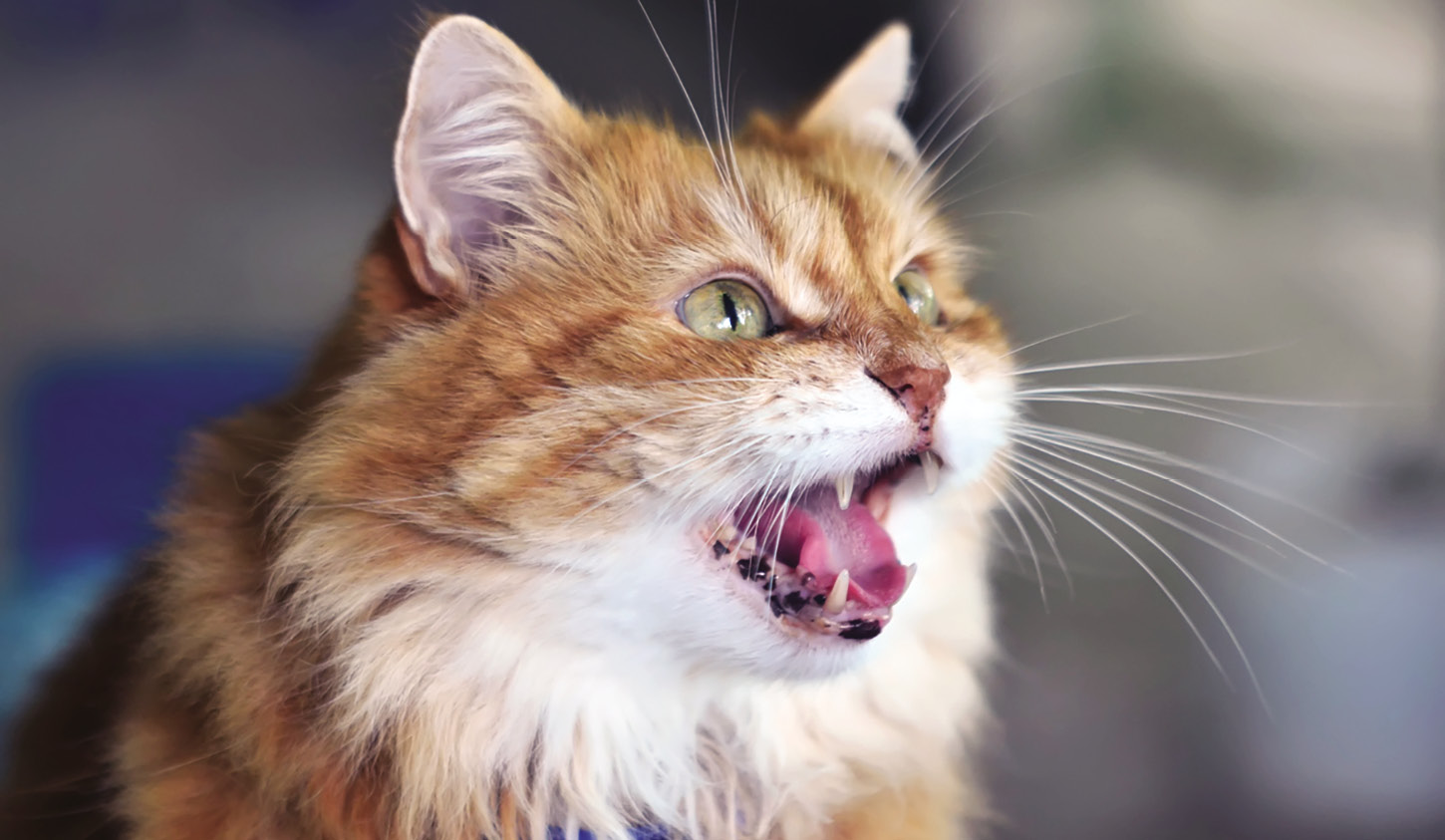
If you feel like all he does is meow all day, consider that he may not feel well.
Most senior bloodwork includes a measurement of thyroid hormone levels. Most veterinarians also screen cats for high blood pressure and for evidence of kidney dysfunction, both of which may occur in hyperthyroid cats. If the thyroid is enlarged, it may be palpable on exam.
Some hyperthyroid cats may intermittently have normal thyroid levels due to other illnesses. In these cases, if your veterinarian still feels hyperthyroidism is a possibility, more involved bloodwork, including an equilibrium dialysis free T4 and/or a T3 suppression test may be recommended.
Treatment
You may be given a choice of several different treatment options for your hyperthyroid cat. Costs vary.
- Surgical removal of the affected thyroid is not done very commonly anymore given the fact that there are other effective means of treating this condition that do not require anesthesia and surgery. It is a tricky surgery, especially since many cats have concurrent cardiac problems such as hypertension. It can also be difficult to get only the thyroid gland and not damage or remove the parathyroid gland, which is a tiny gland associated with the thyroid that regulates calcium levels. Low blood calcium can cause potentially fatal seizures and heart arrhythmias. Damaging this gland can require supplements for life.
Up to 20% of cats will have some thyroid tissue in an abnormal or ectopic location. For these cats, surgery is not a cure. A pre-surgical nuclear scan is often recommended to look for any ectopic thyroid tissue.
- A daily medication called methimazole can be used. This medication must be given for the rest of your cat’s life, usually twice a day. Pilling the average cat twice a day can be unpleasant. Luckily, a transdermal form that you administer as a small dab of gel on the inside of the cat’s ears is effective for many cats.
Side effects of methimazole are generally mild and include vomiting and diarrhea. Some cats will develop a facial itch. Reducing the dose or starting at a low dose and gradually increasing it may help to minimize side effects. Rarely, cats will develop kidney or bone marrow problems when given methimazole. Cats on methimazole should have periodic bloodwork to catch any developing problems early on.
- The use of radioactive iodine has become the treatment of choice for hyperthyroid cats. Iodine is essential for thyroid hormone production. Injecting radioactive iodine concentrates the iodine in the overactive thyroid gland, and the associated radiation, which is very focused within the region of the thyroid gland, destroys overactive thyroid gland tissue. One treatment is generally curative with minimal side effects. Up to 95% of cats are considered cured after their first dose. Radioactive iodine therapy will address any ectopic thyroid tissue, unlike a surgery.
The big catch is that this treatment must be done at a specially licensed facility, since radioactive materials are used. Cornell University is one of the facilities licensed to offer this treatment. Cats will shed some radioactive material in their urine and feces after therapy, so they must stay at the facility with special precautions taken until they are clear due to concerns regarding human risk. The average time for this clearance is between three and five days. While the cost of radioiodine therapy can be somewhat high, it is likely comparable to the long term costs of other therapies when considering the cost of medications, veterinary visits, bloodwork, and/or anesthesia that are associated with other treatment options.
- Limiting dietary iodine by feeding prescription iodine-restricted diets can be effective because iodine is essential for the production of thyroid hormones.
A therapeutic diet is an easy treatment if your cat will eat it, but no other foods can be 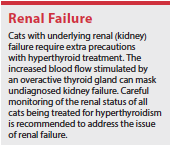 given for the rest of your cat’s life. This can be tricky if you have more than one cat and/or if your cat is allowed outside. Verify with your veterinarian that this diet is adequate if your cat has other health problems.
given for the rest of your cat’s life. This can be tricky if you have more than one cat and/or if your cat is allowed outside. Verify with your veterinarian that this diet is adequate if your cat has other health problems.
The bottom line on feline hyperthyroidism is that it is usually ultimately fatal if left untreated. A frank discussion with your veterinarian can help to guide you to the best options for your individual feline companion.

